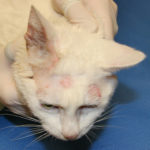Summer Parasites: Part Two
In our last blog, we covered fleas, ear mites, and ticks, external summer pests all of which can cause plenty of harm; at least these parasites can be removed manually and easily treated to an extent. Today’s vermin are a lot different in how they affect our cats. We’ll discuss ringworm fungal outbreaks, as well as heartworm and hookworm infestations which manifest internally in our cats’ digestive tracts. These parasites are lurking almost year-round, however they’re specially active during warmer climate conditions prevalent during Summer. With vermin like these, it’s important to stay up to date with medicating your pets with the appropriate monthly doses per your veterinarian’s advice.
 Ringworm knows no boundaries. It will spread to both humans and animals with ease upon close contact with each other, due to the fact that ringworm is no worm at all, but a fungus spore that is microscopic in size. It lurks in the air and soil where it can either be ingested into the lungs to infect or land on the skin where it can also start an infection. The symptoms of ringworm in cats are patches of hair loss and possible scabbing on the base of the bald spot. You should always talk to your veterinarian about appropriate treatment options for your furry friend. There are many home remedies they may recommend such as Apple Cider Vinegar, which is perfect since unfiltered juice is known to be antibacterial, anti-fungal, and antiviral. This remedy is to be used topically with a cotton ball in bald areas of the cat affected by ringworm. Otherwise, they may prescribe a lime sulfur solution that you would bathe your cat in. While it may not be the most flattering scent, it gets the job done so that our feline friends can get back to feeling comfortable, happy & healthy.
Ringworm knows no boundaries. It will spread to both humans and animals with ease upon close contact with each other, due to the fact that ringworm is no worm at all, but a fungus spore that is microscopic in size. It lurks in the air and soil where it can either be ingested into the lungs to infect or land on the skin where it can also start an infection. The symptoms of ringworm in cats are patches of hair loss and possible scabbing on the base of the bald spot. You should always talk to your veterinarian about appropriate treatment options for your furry friend. There are many home remedies they may recommend such as Apple Cider Vinegar, which is perfect since unfiltered juice is known to be antibacterial, anti-fungal, and antiviral. This remedy is to be used topically with a cotton ball in bald areas of the cat affected by ringworm. Otherwise, they may prescribe a lime sulfur solution that you would bathe your cat in. While it may not be the most flattering scent, it gets the job done so that our feline friends can get back to feeling comfortable, happy & healthy.
Unlike other parasites discussed thus far, hookworms live in the small intestine of most animals it inhabits. Their size varies from five to 15 millimeters in length which equates to about half an inch. They reside in moist soil and can easily traverse through hair, skin, and fluids. If a cat or almost any animal ingests hookworms, the symptoms include weight loss, bloody stool, irritation of the skin, and anemia since hookworms feed on the hosts’ blood. If you see these symptoms, it is best advised to skip home remedies and schedule a vet appointment or purchase over the counter dewormers as long as they are appropriately used. Treatment usually takes up to two weeks since larva eggs may have spread through your cats’ system and repeated treatments overtime will kill remaining eggs.
The summer heat invites mosquitos in troves. Mosquitos enjoy wet and warm environments, so consequently the summer is ripe for their reproduction. They’re notorious for being able to carry and spread vicious diseases like West Nile, Malaria, and, most dangerous for pets, heartworms. Heartworm disease can be fatal towards cats if left untreated, however it’s prevalence is as low as fifteen percent in unprotected cats. As mosquitos bite the skin of a cat, the deposited larvae reproduces and releases microfilaria(heartworms) directly into the bloodstream. Thankfully, a cat’s immune system is able to eradicate up to 90% of the invasive larvae. However, if a cat is infected, the treatment is limited and would only encompass medications to comfort the cat. A cats health should never be skimped on and appropriate parasitic medications should be administered on a regular basis to prevent these diseases.
 Understanding which parasites to look out for and how/where they may harbor and reproduce is beneficial for being a proactive pet owner. It will result in the longevity and prosperous life of your pet, with minimal vet visits. Regardless, it is never enough to know what we know, thus keeping up to date on new parasitic threats in your neighborhood is a habit to keep up with. Spread the info to pet owners like yourself or pet owners you may know to create a safe environment this summer!
Understanding which parasites to look out for and how/where they may harbor and reproduce is beneficial for being a proactive pet owner. It will result in the longevity and prosperous life of your pet, with minimal vet visits. Regardless, it is never enough to know what we know, thus keeping up to date on new parasitic threats in your neighborhood is a habit to keep up with. Spread the info to pet owners like yourself or pet owners you may know to create a safe environment this summer!
Sources:
